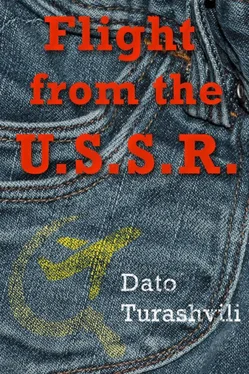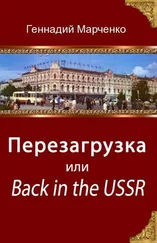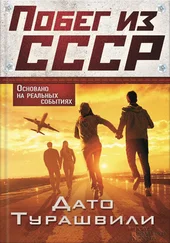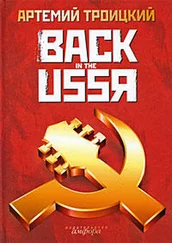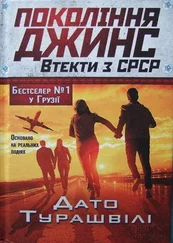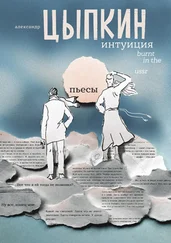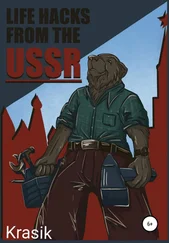The judge stood still for a long time, with the black telephone receiver pressed to his ear, though no one was listening to him anymore. The judge, of course, was replaced…
Eka

The house search began at dawn on February 2nd 1984. Throughout the search, the father and daughter stood side by side, holding hands. The father said good-bye to her in such a way as not to scare Eka. Then Father Tevdore got to his feet with such composure, so much dignity, that no one dared to handcuff him. They followed him.
Several days after the arrest of the monk, they went to search his house again. The only person they found there was little Eka, who watched in astonishment as the men thoroughly searched the house. But Eka wasn’t scared; she simply did not understand what else these unsmiling people could be looking for. She was still quite young, but not the little girl that Soso used to take for walks. Eka loved her dad’s friends, but her dad was her real hero—the only monk who wore jeans, the most adorable dad on the face of the earth.
Little Eka stood motionlessly and waited for the unwelcome visitors to leave. She probably would not have moved at all had one of them not opened the cupboard where she kept her father’s poems. He used to write these poems specially for her. When Eka was little she used to ask for bedtime stories, which her father gladly told, but sometimes she would also ask for poems, so her father made them up for her until she grew up. When Eka learned to write and went to school, she wrote down her father’s poems, in large, round letters, in a notebook which a man was now leafing through. Then he closed it, opened it again and addressed his superior with a question:
“What do we do with this?”
“What is it?”
“Poems.”
“Whose?”
“I don’t know.”
“Read them and you’ll figure out. Ah, you won’t be able to, so bring them along!”
The man was still looking at the poems and about to read them when he suddenly felt a terrible bite on his wrist and let the notebook go. Little Eka immediately picked it up, pressed it to her breast and began to move backwards, towards the wall.
The man first looked down at his bitten wrist in surprise, then looked at Eka closely.
“Your father is a terrorist,” he spat out through his teeth. He started towards the child, but his superior understood right away that the notebook could not be taken away from Eka. He stopped his subordinate and asked him calmly.
“Were there only poems?”
“Dunno, there was nothing but poems, probably written by her.”
“How could you tell, by the content?”
“What do I know about the content, the handwriting’s childish.”
“Have you finished already?”
The chief now looked at the others and without waiting for their answer, motioned all of them to leave the house. They obeyed.
Eka rushed to the window, moved the curtain aside and looked out. The strangers were getting into a car and she waited at the window for a little longer. When the car disappeared around the corner, Eka finally became convinced that the uninvited visitors had really left. She opened the drawer where she kept another book, a music notebook. The strangers could not have known that the monk, whose house they searched for weapons, wrote music as well. Eka wrapped up the sheets with her father’s music together with his poems and tied them with a piece of string, and then she took a spade and went to the backyard. First she looked around to make sure no one was watching, and then began to dig. The hole she dug was not deep but the music and poetry were well hidden.
The cruelty of the authorities’ propaganda was so vicious that nobody wanted to sit next to Eka after her father’s arrest. She sat alone at her school desk like the daughter of a state enemy. She tried not to turn bitter. After the trial, the fourteen-year-old girl wrote a letter to the Party First Secretary, asking him to spare her dad. Realizing she would not get an answer, Eka went to the Central Committee in person. She attempted to get an answer everywhere she possibly could, everywhere she thought her dad would be.
For today’s teenagers, it might seem utterly unbelievable that a little girl would undergo such pain to find her father. She spent several years going through distant camps—all on her own.
She was spurred on by unconditional love. She wrote about her love to her father in her letter, saying her life would lose its meaning without him. In the letter Eka also said she wasn’t aware of the reason her parents had divorced, but she knew exactly why they had met in the old film studio courtyard. In those days Father Tevdore was Temur Chikhladze—a highly educated, green-eyed young man, very popular with girls. Temur fell in love with a woman who would later become Eka’s mother.
At the time Temur fell in love, he was offered a part in a Georgian film The Philatelist’s Death which was filmed in Sarpi, a Georgian-Turkish border village. Not surprisingly, the area was heavily guarded round the clock. As soon as he arrived to Sarpi, Temur sought out the most experienced fisherman and soon befriended a local to go out into the calm sea at night to fish.
Eventually, the border guards grew accustomed to the film crew—their eccentricities and nightly partying. And one night, when Temur borrowed the fisherman’s boat, the guards did not suspect foul play—the boat and its owner were familiar they occasionally received the catch, which the young Russian guards happily accepted.
As he rowed away from the shore, Temur was surprised and expected to be stopped any minute. He awaited the guards with a small fishing rod in his hand, ready to provide evidence that he did not plan to violate the Soviet border and sail to Turkey.
Rather than breaking the waves, the boat floated in the calm sea. Close to dawn, Temur suddenly realized he was reaching the point of no return: he had to make up his mind whether he was to cross the line or return to his beautiful sweetheart. It was unclear how far the border guards would have allowed him to sail before springing into action but he eventually turned towards shore where Eka’s future mother was waiting for him.
Years later, when the death sentence was announced for monk Tevdore Chikhladze, he addressed the authorities with only one request—he wanted to see his daughter Eka before the execution. However, the last will of this innocent man was turned down.
Even more years later, Eka wrote a book dedicated to her father—honouring him as a person who predicted the disintegration of the Soviet Union as long ago as her childhood. Eka’s book included large amounts of previously unpublished, or completely unknown, material concerning the hijack case. She also focused on a theory that the authorities were warned about the planned hijack well in advance. The details of this argument were well grounded and persuasive as there were a lot of facts to support the idea. The authorities chose not to stop the implementation of the plan, as they needed the hijack attempt in order to organize their show-trial.
On the eve of the trial, the monk was interrogated for the last time. Several investigators and high-ranking officials were present. They wanted to know exactly what the monk would say at the trial, and wanted to be absolutely sure everything would follow their scenario. Consequently, when the monk once again confirmed that he would take the blame entirely upon himself in order to save the others, the investigators threw contented glances at the high-ranking officials. One of them addressed the monk.
Читать дальше
